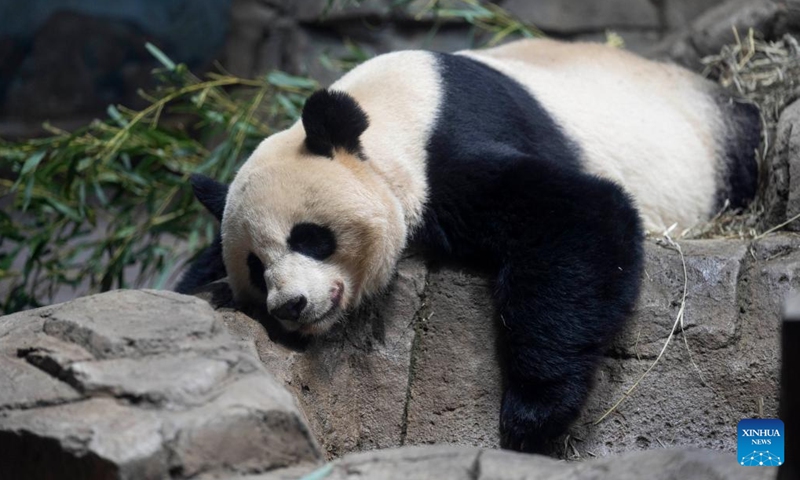
Tourists take photos of giant pandas at Smithsonian's National Zoo in Washington, D.C., the United States, on March 16, 2022.(Photo: Xinhua)

Photo taken on March 16, 2022 shows giant panda Mei Xiang at Smithsonian's National Zoo in Washington, D.C., the United States.(Photo: Xinhua)

Photo taken on March 16, 2022 shows giant pandas Mei Xiang (L) and Xiao Qi Ji at Smithsonian's National Zoo in Washington, D.C., the United States(Photo: Xinhua)

Photo taken on March 16, 2022 shows giant panda Xiao Qi Ji at Smithsonian's National Zoo in Washington, D.C., the United States(Photo: Xinhua)
The Smithsonian's National Zoo and Conservation Biology Institute has kicked off a months-long celebration of the 50th anniversary of its giant panda program.
Located in northwest Washington, D.C., the famed zoo announced a series of online and on-site events starting March 16 through Aug. 27 to mark "50 years of unprecedented achievement in the care, conservation, breeding, and study of giant pandas."
"After 50 years, giant pandas remain an iconic species for our zoo," said Brandie Smith, John and Adrienne Mars director, Smithsonian's National Zoo and Conservation Biology Institute, in a statement.
"More importantly, they represent how great conservation outcomes can be achieved through great partnerships with our Chinese colleagues," Smith underlined. "Being able to introduce hundreds of millions of people worldwide to pandas and inspiring them to care about their conservation for five decades, coupled with our scientific breakthroughs, is a milestone truly worth celebrating."
At least hundreds of visitors -- mostly parents and their children -- explored the zoo's giant panda habitat around Wednesday noon.
While the fluffy bears in black and white were all sleeping, people still enjoyed the sight of them while curious to learn knowledge of the valuable species through posters on the wall.
In the outdoor exhibit is the Giant Panda Family Tree Photo Gallery, where there are photos and information about the zoo's giant panda breeding program and how cubs born there are contributing to their species' survival in China.
More events will come next month. On April 16, visitors can enjoy lion dance performances, panda-shaped buns, and calligraphy demonstrations at the habitat, while the giant pandas will receive special enrichment treats.
There are currently three giant pandas living in the zoo -- 23-year-old female Mei Xiang, 24-year-old male Tian Tian, and their 18-month-old male cub Xiao Qi Ji.
Mei Xiang gave birth to three other cubs in the zoo, all of who returned to China when they were four years old as part of the institute's cooperative agreement with the China Wildlife Conservation Association (CWCA).
Ever since their arrival at the zoo, giant pandas have symbolized cross-cultural collaboration between the United States and China.
In 1972, then-Chinese Premier Zhou Enlai gifted two giant pandas to the United States as a gesture of goodwill following then-U.S. President Richard Nixon's groundbreaking visit.
Nixon and his wife, Pat Nixon, selected the Smithsonian's National Zoo as female Ling-Ling and male Hsing-Hsing's home in the United States.
Then-Zoo Director Theodore Reed personally escorted the bears from China, and they arrived in Washington, D.C., on April 16, 1972. Four days later, Pat Nixon formally welcomed the giant panda pair to the zoo.
For five decades, the zoo has cared for the giant pandas by creating and maintaining one of the world's foremost panda conservation programs. Collaboration between Chinese colleagues and the zoo's team of animal care staff, scientists, and researchers has been the cornerstone of those efforts.
The unified effort to create and share knowledge is saving this species from extinction. Giant pandas are listed as "vulnerable" in the wild by the International Union for Conservation of Nature. There are an estimated 1,800 in the wild.
The zoo has renewed its Giant Panda Cooperative Research and Breeding Agreement with the CWCA three times since 2000.
The current research agreement extension was signed on Dec. 7, 2020, and stipulates the zoo's pandas will continue to live at the zoo through 2023. In exchange, the zoo contributes funds and expertise toward conservation efforts in China.







